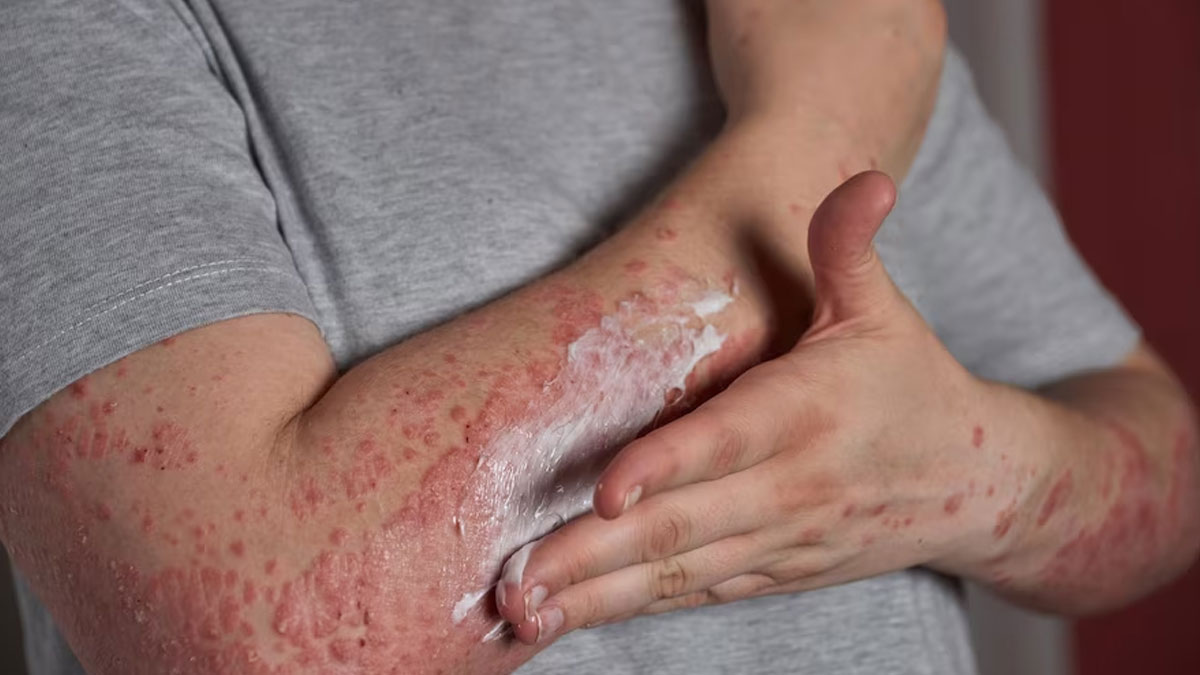Men are twice as likely as women to develop psoriasis: Experts
Fri 30 Aug 2024, 01:39:00

It is noteworthy that, according to doctors on Wednesday, men are twice as likely as women to have psoriasis. August is designated as Psoriasis Awareness Month each year. An autoimmune skin condition called psoriasis causes thick, red, scaly areas on the scalp, lower back, and elbows.
Environmental and genetic variables play a role, with men more susceptible because of differences in hormones, genetic predispositions, and lifestyle choices.
What is psoriasis?
Psoriasis is a long-term skin disorder marked by thick, red, scaly skin patches caused by a fast buildup of skin cells. The elbows, knees, lower back, and scalp are the most often affected areas. This is an autoimmune disease that causes a cluster of immature skin cells.
Symptoms include
. Itchy or burning feelings
. Swollen nails dry
. Cracked skin
. Red areas covered in silvery scales
While there is no cure, medications and lifestyle changes can help manage the condition and prevent problems.
"Notably, psoriasis seems to affect men more frequently than women. Men can additionally delay getting medical help, which could result in symptoms that are worse by the time they are diagnosed. Itchy or burning feelings, swollen or pitted nails, dry, cracked skin that may bleed, and red areas of skin coated in silvery scales are typical signs of psoriasis. Although there isn't a cure for psoriasis, there are medications and lifestyle modifications that can help control the condition and avoid problems," said Dr Ruben Bhasin Passi, Consultant -
Dermatology, C.K. Birla Hospital Gurugram.
Dermatology, C.K. Birla Hospital Gurugram.
Psoriasis prevalence is influenced by hormonal differences, genetic predisposition, environmental and occupational exposure, and immune system differences. Oestrogen, a hormone with anti-inflammatory properties, is higher in women, while testosterone, predominant in men, may exacerbate inflammatory pathways.
What causes psoriasis in men?
Men may inherit certain genes linked to immune system regulation and skin cell turnover, increasing their susceptibility to the condition.
Environmental triggers like stress, smoking, and alcohol consumption, as well as occupational hazards, can exacerbate psoriasis symptoms. Men's immune systems tend to mount more aggressive inflammatory responses, leading to an increased risk of autoimmune conditions like psoriasis.
"Psoriasis prevalence is influenced by hormonal differences, genetic predisposition, environmental and occupational exposure, and immune system differences. Women have higher oestrogen levels, while men have predominant testosterone. Men inherit genes linked to immune system regulation, environmental triggers, and occupational hazards. The psychological impact is profound," said Dr Rashmi Aderao, dermatology consultant at Pune's Ruby Hall Clinic.
"Men can additionally delay getting medical help, which could result in symptoms that are worse by the time they are diagnosed," Dr Passi added.
Overall, it is a disease that need not be stigmatised owing to gender constructs, because it can be prevented from escalating in the first place if changes are made to lifestyle.
No Comments For This Post, Be first to write a Comment.
Most viewed from Health
AIMIM News
Latest Urdu News
Most Viewed
May 26, 2020
Do you think Canada-India relations will improve under New PM Mark Carney?
Latest Videos View All
Like Us
Home
About Us
Advertise With Us
All Polls
Epaper Archives
Privacy Policy
Contact Us
Download Etemaad App
© 2025 Etemaad Daily News, All Rights Reserved.






























